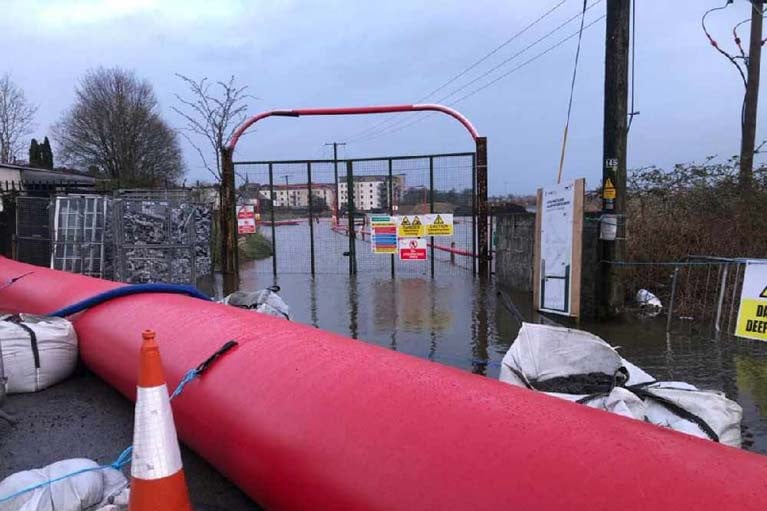Displaying items by tag: flood
Renewed Calls for Single Management Agency for River Shannon
As Storm Jorge swept in from the Atlantic, there have been renewed calls a single river management agency for the Shannon.
Farmers and residents along the river can no longer cope with “despair” and constant fear of flooding, Mid-Shannon flood relief group chairman Michael Silke told The Sunday Times.
Some farmers have experienced up to six serious flooding instances in 25 years, he pointed out.
“These are people who were told during floods in 2009 that this was a one in a hundred-year event – clearly not true when we had a recurrence in 2016 and now,” Mr Silke said
If one Shannon management agency was established, bogland could be used as a natural “sponge” to relieve pressure along critical stretches, Mr Silke told The Sunday Times.
Mr Silke said that half of his own beef and sheep farm has been covered in water since last week, but emphasised that many of his neighbours in the Shannon area were in a far worse situation, with flooding in homes, yards and across swathes of land.
“Leaving the Shannon to the ESB, Waterways Ireland and Office of Public Works (OPW) to manage it is not working,” he said.
However, the OPW approach and its Catchment Flood Risk Assessment and Management (CFRAM) work was defended yesterday by outgoing Minister of State for the OPW Kevin “Boxer” Moran on RTÉ Radio.
In Galway, harbourmaster Capt Brian Sheridan said that “joined-up thinking” was also required for management of severe weather events on the Atlantic seaboard.
“Galway city has dodged a bullet again this weekend, only because the peak of the storm coincides with low tide,” Capt Sheridan said.
“Met Éireann provides a great service, but we need more geographically specific real-time information,” he said. For more, read The Sunday Times report here
Coffin Transported By Boat for Funeral in Longford
The remains of a Longford man were taken by boat for burial at Saints Island Cemetery because the causeway to the island has been eroded in heavy flood water from Lough Ree.
Warning When Accessing Flooded Areas In Boats & Flotation Devices
Waterways Ireland continues to advise caution while extensive flooding continues across all navigations. Advice has also been issued by ESB networks in relation to available clearance under overhead or sunken electricity cables.
ESB Networks is warning members of the public and emergency services to be vigilant when moving around flooded areas in boats and other flotation vehicles.
The electricity network is designed to have ample clearance for access and egress during normal conditions. However, when areas are flooded, this clearance level may be affected.
The electricity network is live and should not be approached. Electricity wires are dangerous even at close proximity and where clearance is compromised, you should not pass under them.
If you see any sagging electricity wires or wires submerged in water, please do not steer your boat over these. Do not use oars or anything else to lift or move electricity wires. Please report any poor clearance issues immediately to ESB Network at 1850 372 999.
ESB Networks is currently assessing the electricity network in flooded areas to assess damage and identify safety issues.
'Flooding in Ireland Will Worsen Without Climate Change Deal' - MEP Kelly
"Ireland will be one of the hardest-hit countries in Europe and suffer more coastal and river flooding incidents in future, if a deal to limit global warming is not achieved in Paris," said Seán Kelly MEP, a member of the European Parliament's negotiating team at the UN's Global Climate Change Conference in Paris this evening (Thursday).
"Unfortunately, many families in Ireland are once again dealing with the terrible consequences of flood damage to homes, farms and businesses. This is a consequence of climate change which will become a more frequent occurrence in future if we do not take urgent action to lower carbon emissions," he said.
The Ireland South MEP told fellow negotiators in Paris that Ireland is particularly vulnerable to flooding because of high rainfall levels and our Atlantic location.
Mr Kelly further cited last year's study by the Joint Research Centre of the European Commission which examined the possible future Climate Change effects if the global temperature rises by 3.5 degrees Celsius.
"Currently, flooding currently affects 160,000 people in Europe every year but the JRC study revealed that that number could increase to 290,000 in future.
"Across all sectors, Climate Change is causing 190 billion euros worth of damage in the EU annually. But the experts predict that figure could double if no action is taken. It is estimated that flood damage alone could account for €10 billion."
"The message is clear. If current global warming continues unabated, Ireland and the rest of the world will suffer from more flooding incidents. That is why we are here in Paris, pressing our global counterparts to compromise and agree on a deal.
"I believe a deal can be done to prevent this kind of nightmare future. Prevention is better than the cure - the amount of money we spend to repair the damages caused by the effects of Climate Change are far greater than what we could invest now in clean technologies and energy infrastructure that accommodates high share of renewables and so on.
"Reducing emissions now can save our environment, prevent unprecedented levels of damage, like that of the flooding witnessed in Ireland in recent days, and save lives in some cases," Mr Kelly continued.
#Weather - While Britain faces a heatwave with temperatures in excess of 30 degrees, thanks to a 'Spanish plume' of hot air sweeping up from Southern Europe today (17 July), only Ireland's south is expected to see the mercury rise significantly.
However, as Independent.ie reports, we're in for a few muggy nights and days of thundery rain that bring the risk of flash floods in vulnerable areas, with Met Éireann issuing a weather warning for the whole country.
"The biggest risk of flooding is with this band of thundery rain moving northwards but anywhere that gets a thunderstorm is at risk," says meteorologist Joan Blackburn.
Independent.ie has more on the story HERE.
Met Éireann Issues Small Craft Warning as Rain and Winds Sweep In
#WEATHER - Met Éireann has issued a weather warning for much of the Irish coast today (Monday 24 September) as heavy rain and strong northwesterly winds sweep in across the country.
Winds are expected to reach gale force tonight on northwestern, northern and eastern coasts from Erris Head in Mayo to Malin in Donegal to Wicklow Head.
As The Irish Times reports, fishermen in small craft are advised to take caution as wind speeds are set to top force six or higher as the day progresses.
Persistent rainfall in most of Leinster and Ulster may also lead to flash flooding in some areas.
DCC Rejects Clontarf Flood Defence Plan
#DUBLIN BAY NEWS - Dublin City Councillors have unanimously rejected controversial plans for flood defences in Clontarf.
As previously reported on Afloat.ie, councillors were set to vote last night on whether to give the green light to the scheme, which has faced strong opposition from local residents and business owners.
The flood barrier would have involved the construction of mounds or walls up to and above 7ft high along the Clontarf promenade.
However, following a vote last night, a redesigned proposal was rejected by the council, with officials admitting to The Irish Times that the public consultation process "didn't work".
Labour councillor Jane Horgan Jones said that it was now up to council officials and the local community to develop an acceptable plan to protect Clontarf from flooding in the future.
"However this is done, it must not be at the cost of destroying a beautiful, free and natural amenity that has been used by generations of Dubliners, from within and outside Clontarf, for many years,” she said.
The Irish Times has more on the story HERE.
DCC Votes Tonight on Clontarf Flood Defences
#DUBLIN BAY NEWS - BreakingNews.ie reports that Dublin City Councillors will vote tonight on whether to give the green light to the controversial flood defence plan for Clontarf.
Thousands of people have held protests in the north Dublin suburb over recent weeks to show their opposition to the plan, which involves mounds or walls up to and above 7ft high, arguing that the council did not allow for any public consultation.
As previously reported on Afloat.ie, the Irish Sailing Association has urged DCC to defer the vote, which has also faced strong opposition from local business owners.
Sailing Body Joins Clontarf Flood Defence Protests
#DUBLIN BAY – The Irish Sailing Association has urged Dublin City Council to defer next week's vote on flood defences at Clontarf promenade.
The sailing body has written to Dublin City manager John Tiernan arguing that the Council did not allow for any public consultation of the plan which involves mounds or walls up to and above 7ft high.
The association is supporting the efforts of Clontarf Yacht and Boat Club and other residents and businesses who say the plan does not take into account the amenity value of the surrounding waters.
Liffey Descent Postponed Due To Lack of Water
The annual Liffey Descent canoe race has been pushed back by a month - due to a lack of water.
The Irish Canoe Union (ICU) announced that due to significantly low water levels in the ESB reservoirs that provide the flood for the race, the event has been postponed till 8 October.
Organisers said they were left with the "difficult decision" to either postpone the event or run the things as scheduled on 10 September without the flood.
“It is considered that the running of the race in the absence of the excitement generated by a flood would detract from its value as the premier Irish canoeing event," said a statement from the ICU.
The Liffey Swim has been an institution since 1960, atracting canoeists from around the world every September for the run from Kildare to Islandbridge.
The Irish Times has more on the story HERE.


































































